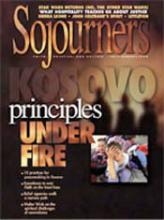Yugoslavs long-term leader Tito was extraordinarily successful in his 35-year struggle to marginalize the Orthodox Church. Throughout the Tito era, it was a major disadvantage to put ones toe in the church door. Those who wanted to advance in life had to join the Communist Party, in which atheism was obligatory. Tito died in 1980, but many of his social policies survived, including the view that religion belonged to the past.
Further complicating the problem of the churchs role in post-Tito Serbia is that the church, however crippled by past oppression, is the only institution that still incarnates Serbian identity. This has led Serbian nationalists, in many cases atheists, to value the church for "cultural" reasons even while regarding its views on ethical and political principles as irrelevant.
Yet the direction of the churchs hierarchy, while wanting to preserve all that is good in Serbian identity and tradition, has been to oppose ultra-nationalism and to speak out clearly, even at personal risk, against all that Milosevic and others like him represent.
The churchs pastors see the neglect of spiritual life as being at the heart of the nations crisis. "For 60 years under communism, atheism was the official religion," Bishop Lavrentije of Sabac-Valjevo explained in a press interview in 1995. "For 50 years priests were forbidden from going into schools and from visiting the army. People were educated without any contact with belief in God, and were taught that there was no soul. Those generations [who received an atheist education] are now soldiers. That is the reason for genocide. As one philosopher said, If you take away God from man, man becomes the strongest animal."
Read the Full Article

